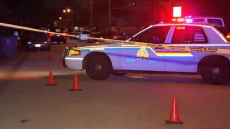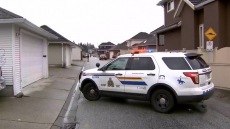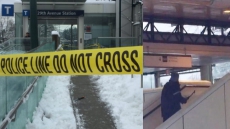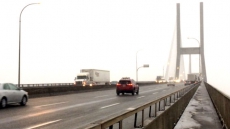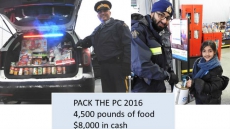The number of overdose deaths related to illicit drugs in British Columbia leapt to 755 by the end of November, a more than 70-per-cent jump over the number of fatalities recorded during the same time period last year.
The BC Coroners Service says the powerful opioid fentanyl remains present in a high number of the fatalities and was detected in 374 of the cases, or about 60 per cent of the deaths.
In November, 128 people died from illicit drug use, an average of more than four a day. The highest number of deaths previously recorded for a single month was 82 in January.
Chief coroner Lisa Lapointe said the latest numbers have left officials asking why there has been a spike in the number of deaths.
"Why, with all the new harm-reduction measures in place, are we still losing so many members of our communities to illicit drugs, and why was the loss so much higher in November?" she asked at a news conference.

"Clearly illicit drugs are becoming increasingly unpredictable and increasingly perilous. It may be that there has been more toxic fentanyl than usual circulating, or we may be facing the terrifying possibility of carfentanil being introduced broadly into the illicit drug stream, or the arrival of another particularly lethal analogue of fentanyl."
Lapointe said the service will work with the provincial toxicology centre to try to determine what caused the increase in deaths.
Since declaring a public health emergency earlier this year, the province has taken a number of steps to try and fight the overdose crisis.
The province's latest move was to announce plans for overdose-prevention sites in Vancouver, Victoria, Surrey and Prince George where people can inject illicit drugs while monitored by trained professionals equipped with naloxone, which reverses the effects of opioid overdoses.

They are in addition to two existing safe-injection sites in Vancouver that are specifically designed for people to inject drugs under medical supervision.
The crisis took another troubling turn on Friday when an urgent warning was sent out to illicit drug users after 11 people died in the province the day before, six of them in Vancouver's Downtown Eastside.
Vancouver Mayor Gregor Robertson said there are about 1,300 people in Vancouver using illicit opioids every day.
The city passed a budget last week that includes a 0.5-per-cent increase in property taxes to support frontline service providers, including firefighters who have been seeing multiple overdoses per day.

It has said the firefighters responded to 745 calls about drug overdoses in November, and crews had to use the overdose-reversing drug naloxone 35 times.
A LOOK AT THE NUMBERS BEHIND BRITISH COLUMBIA'S OVERDOSE CRISIS
CLIMBING DEATH TOLL: The total number of deaths due to illicit drugs reached 755 by the end of November, a 70.4-per-cent increase from the same period last year.
NOVEMBER SPIKE: Provisional data shows 128 people died as a result of illicit drug use in November, an average of more than four a day. The previous high for a single month was 82 in January.

FENTANYL FACTOR: From the beginning of January to the end of October, fentanyl was detected in 374 cases, or about 60 per cent of all illicit drug deaths. That's almost triple the number of fentanyl-detected deaths for the same period last year.
ONE DAY DEATH TOLL: On Dec. 15, at least 11 people died of illicit drug overdoses.
OVERDOSE-PREVENTION SITES: Eighteen overdose prevention sites will have opened by the end of December in high-risk areas in Vancouver, Surrey, Victoria, Prince George, Kelowna, Kamloops, Maple Ridge, Langley and Abbotsford where people can inject illicit drugs while being monitored by trained professionals. They are in addition to the two safe-injection sites operating in Vancouver.

FIGHTING OVERDOSES: The BC Centre for Disease Control is expanding its Take Home Naloxone program. So far, 17,828 free naloxone kits have been distributed, with more than 12,000 handed out this year alone. Naloxone reverses the effects of opioid overdoses.
DRUG SEIZURES: Police in Victoria seized 1.45 kilograms of fentanyl on Nov. 29, and the Canada Border Services Agency has made 47 seizures of fentanyl or carfentanil weighing a total of 11.7 kilograms so far this year.
SOURCE: B.C. government, coroner's service.


